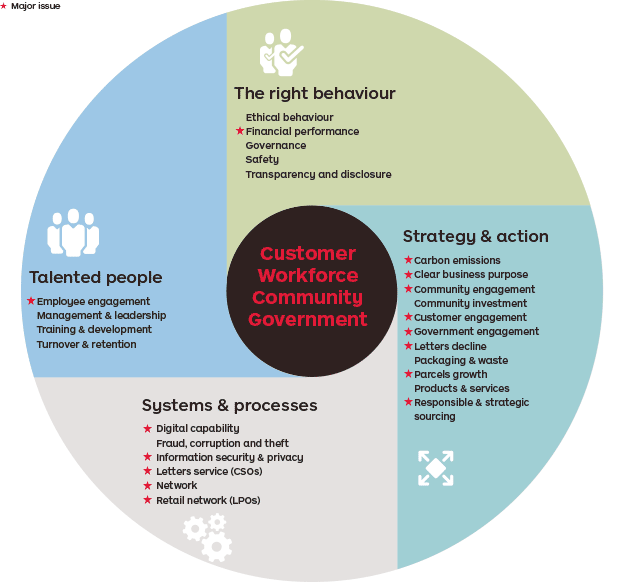Australia Post is transforming. The changes we have introduced over the past four years under our Future Ready program have been vital to protecting our brand, preserving our community services and maintaining profitability. But we have to keep adapting to manage the challenges and capture the opportunities resulting from the community's behavioural shift to digital communication and transaction channels.
Our primary stakeholder groups include our workforce, our customers, government and the broader community. Other important stakeholders include regulatory bodies, suppliers, industry organisations and peak bodies, environmental groups and the media.
As our business success is largely dependent on the support of these key stakeholders, we undertake a number of activities to engage with them. This year our efforts were focused on engaging the community in discussion and debate about the declining use of letters and the best way to adapt our business to make it more sustainable.
Understanding our stakeholders
Every year we conduct surveys, interviews and focus groups to understand the needs of our stakeholders and the way our business impacts them. We discuss our postal and logistics services with consumers, small business and corporations. We also conduct staff attitude surveys and focus groups to understand what our employees think about our business. The data and research we collect enable us to draw better insights and improve our stakeholders' experience.
An integrated stakeholder engagement approach
We are working in a coordinated way to manage the stakeholder impacts of our business transformation program. In 2013–14 we continued to drive an integrated approach to stakeholder engagement through cross-functional collaboration forums and integrated management.
During the year we developed and tested stakeholder assessment tools for our business leaders to empower them to identify how certain business decisions or service changes will affect our stakeholders. This helped us to determine the individuals and groups who have a stake in their project, and the engagement activities required to build support for change.
National and local community engagement
This year we entered into a more active phase of stakeholder engagement to publicly make the case for reforming our letters service. This involved engaging the government and media on the issues surrounding the sustainability of our letters business.
We also started to engage the broader Australian community in the need for change – and invite Australians to participate in a conversation about what they want. Our community engagement campaign aims to shift community perception on the need to reform our letters services, as well as encourage understanding and acceptance of change. The various elements of this community engagement campaign include:
- Community Discussion Groups: The first phase of the campaign launched in April 2014 with a pilot series of local community discussion groups in nine locations across the country. These periodic face-to-face community discussion groups enabled us to engage in topics of interest to the local community and give us insights into how different communities view their relationship with Australia Post.
- National Conversation Platform: We launched an online “national conversation” platform (auspost.com.au/conversation) in June 2014. This platform enables the entire community to participate in a conversation about the “Post of Tomorrow” and allows us to engage with a large number of Australians simultaneously across a range of topics. Australians can use this platform to view information, videos and fact sheets about Australia Post, participate in a discussion forum, ask a question, or complete a survey.
Our community engagement campaign will expand over 2014–15 and will include activities such as briefings with the leaders of key community representative groups, a social media influencers program, and local activities such as “town hall” meetings.
Australia Post Stakeholder Council
Our Stakeholder Council is an external advisory group of 10 individuals whose role is to help us improve our communication and engagement with stakeholders.
The council typically meets three times a year and is chaired by an Australia Post board member. Council members offer a range of views, representative of their roles and experience in small and medium business, industrial relations, direct marketing and corporate responsibility.
For more information about our Stakeholder Council, visit auspost.com.au/annualreport2014.
Stakeholder Council statement
For several years the Stakeholder Council has had the opportunity to guide and review Australia Post's approach to best practice integrated annual and corporate responsibility (CR) reporting.
In reviewing the corporation's fourth integrated annual report this year, we believe that Australia Post has continued to advance its commitment to CR and sustainability. Efforts to evolve the coverage of the corporation's material issues and further integrate its social and environmental performance within the 2014 report reflect a strategic, whole-of-business and supply chain focus on delivering improved social and environmental outcomes for the Australian community.
The report again provides a transparent representation and clearly integrated material in relation to Australia Post's performance that is accessible to all stakeholders.
Australia Post Stakeholder Council
August 2014
Identifying the issues that matter
Producing an integrated annual report, which incorporates our corporate responsibility and financial information, demonstrates our proactive approach to reporting.
A key element of best practice reporting involves a comprehensive materiality process to determine the societal and environmental issues that present risks or opportunities to our business, and issues of greatest concern to our stakeholders.
We aim to provide a balanced representation of those issues identified as “material” by covering them in depth in this report.
Having undertaken a rigorous materiality assessment in 2012, this year we further refined our process and focused our efforts on reviewing the previously identified issues and their ranking to ensure they remained relevant to our business and stakeholders.
An assessment of these was conducted with internal stakeholders – including representatives of our Risk and Compliance, Stakeholder Relations, Workplace Relations, Sustainability and Community Relations areas. We also drew on a number of source materials such as recent customer research and media coverage. The final rankings were then tested with Australia Post's Stakeholder Council.
The diagram below highlights those issues that ranked highest on our materiality matrix, which maps both business impact and stakeholder concern.
The issues that matter

